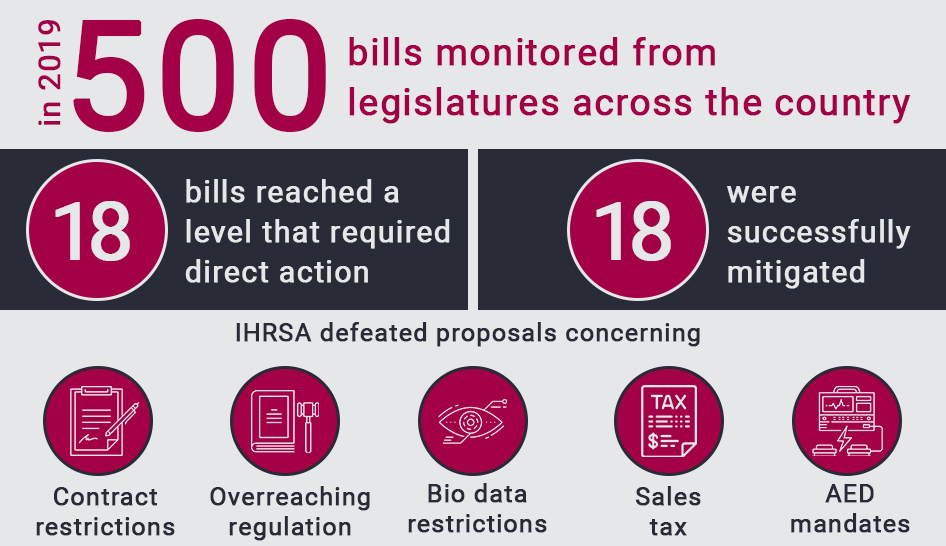What About the Legislation Still in Motion?
Some of the bills IHRSA watched in 2019 will make a comeback in the coming session. In New Hampshire and Washington, three victories may be short-lived.
Washington: VICTORY in 2019, PENDING for 2020
IHRSA fought back against S.B. 5553, an intrusive bill that would have mandated health clubs comply with unprecedented permitting and health and sanitation reporting requirements.
S.B. 5553 would have required annual permitting and inspections—paid for by clubs—and allowed local officials or the Secretary of Health to establish civil penalties for violations, potentially costing clubs thousands.
IHRSA submitted testimony opposing S.B. 5553 and mobilized a coalition of club operators to oppose the bill. The coalition's grassroots efforts of calling the sponsor, writing letters, and testifying helped defeat the proposal.
Though we defeated the bill in 2019, we must remain vigilant. Washington lawmakers could bring it back for further consideration in 2020.
New Hampshire: VICTORY in 2019, PENDING for 2020
IHRSA opposed H.B. 536, which sought to add biometric privacy to the state consumer protection code. The way the bill defined biometric information—to include sleep, health, or exercise data—was so expansive that it could have encompassed anything.
This ambiguity led IHRSA to submit testimony opposing the bill. IHRSA worked with club operators in N.H. to request the bill redefine its definitions.
While we stopped the bill in 2019, we expect lawmakers to revisit the bill for further consideration in 2020.
New Hampshire: VICTORY in 2019, PENDING for 2020
IHRSA submitted testimony regarding New Hampshire S.B. 319, which required health clubs to maintain an AED onsite without providing sufficient liability protection.
We expect lawmakers will consider this legislation in the next legislative session. IHRSA is actively working with a coalition of organizations in New Hampshire to amend this bill to include all necessary protections.
What Are the Pending Bills?
Many states are entering the second year of their two-year legislative session. Therefore, legislation proposed in 2019 is still eligible for consideration in 2020. Though all bills from legislatures that will not meet in 2020 are effectively dead.
Legislatures not meeting in 2020 include:
- Montana,
- Nevada,
- North Dakota, and
- Texas.
Virginia and New Jersey will begin the first of their two-year legislative sessions in 2020. However, New Jersey's current Legislature will extend until January, meaning if the bills listed below do not pass during the lame-duck session, they will be dead in 2020.
Pending AED Legislation
Georgia: S.B. 12
Requires health clubs to have at least one functional AED and have staff complete the American Heart Association or American Red Cross training. S.B. 12 does include liability protection for AED users, Good Samaritans, and owners.
Massachusetts: H.B. 1890
All health clubs would have to develop written emergency response policies and procedures. These plans would need to be reviewed and rehearsed regularly and made publicly available to all health club members.
Also, AEDs would need to be easily accessible, well-marked, known to staff, and located near a form of communication.
Massachusetts: S.B. 203
Requires public and semi-public athletic recreation facilities to practice a medical emergency response plan annually.
New Hampshire: S.B. 319
Requires health clubs to maintain an AED onsite. IHRSA has worked with the sponsor and coalition partners to strengthen the liability protections of this bill.
Pending Auto-renewal Legislation
New Jersey: Assembly Bill 1460 & S.B. 2326
These proposals want to establish notification requirements for auto-renewal in service contracts. Pending through the first week of January 2020 during lame-duck session only.
New York: S.B. 1475 & A.B. 3173A
Prohibits certain business practices concerning automatic renewals or continuous service offers to consumers in the state.
North Carolina: H.B. 686
Changes notification requirements for automatically renewing contracts.
Vermont: H.B. 327
Allows the cancellation of any automatic renewal contracts agreed to online via an online method.
Pending Biometric Data Legislation
Illinois: H.B. 3024
Adds electrocardiogram data to Illinois' BIPA law. This law has already caused health clubs many frivolous lawsuits.
Illinois: S.B. 2134
Amends BIPA to delete language creating a private right of action, the part of the law that is currently causing health clubs many lawsuits.
New York: A.B. 1911 & S.B. 1203
A.B. 1911 and S.B. 1203 will establish the biometric privacy act. Creating written policies for data retention and destruction and would require written consent to use the biometric data.
S.B. 1203 would also allow customers to take legal action against businesses that fail to comply with these requirements. In Illinois, this provision has resulted in lawsuits for many club owners.
New York: A.B. 235 & S.B. 2500
Prohibits private entities from using biometric information for advertising, marketing, or promotion purposes, or for "any other activity that is intended to influence business volume."
New Hampshire: H.B. 536
Adds “biometric information” to the consumer privacy act. IHRSA submitted testimony expressing concern with the vague definition of this bill.
Rhode Island: H.B. 5945
This bill would establish BIPA—modeled on the troublesome Illinois law—in Rhode Island, and create a private right of action leading to lawsuits for clubs.
Pending Consumer Protection Legislation
Illinois: H.B. 1382
H.B. 1382 amends the Physical Fitness Facility Medical Emergency Preparedness Act. Currently, this bill has no text, and the goal is unclear.
Massachusetts: H.B. 280, H.B. 273, & H.B. 321
H.B. 280 is an unnecessary proposal that would require displaying membership fees, which is already required by law.
H.B. 273 allows suspension of health club memberships for disabled members.
H.B. 321 requires health clubs that sell memberships online to offer online cancellation.
Washington: S.B. 5553
Mandates health clubs comply with unprecedented permitting and health and sanitation reporting requirements. IHRSA submitted testimony opposing S.B. 5553 and organized a coalition of members to oppose the bill.
States With Pending Safety Legislation
Massachusetts: S.B. 1337
Requires public buildings to maintain medical trauma kits.
States With Pending Sales Tax Legislation
Nebraska: L.B. 507
Eliminates the sales tax exemption for individual massage and personal training services.
Pennsylvania: H.B. 76 & S.B. 76
Removes property taxes while expanding the sales tax to include health club memberships and services.
States With Pending Tax-Exempt Competition Legislation
Ohio: H.B. 196
This bill would only exempt gym memberships operated by a nonprofit from sales tax.

